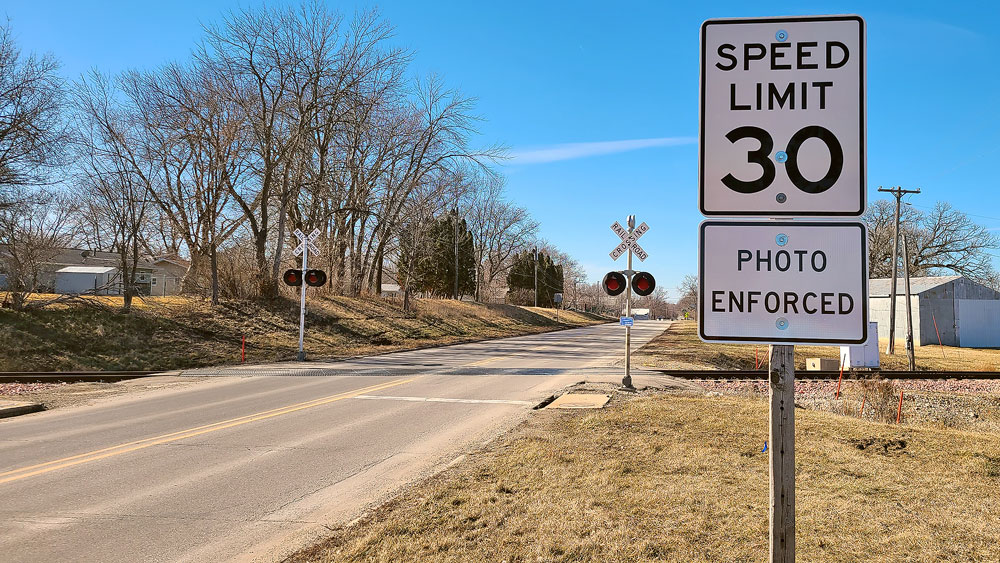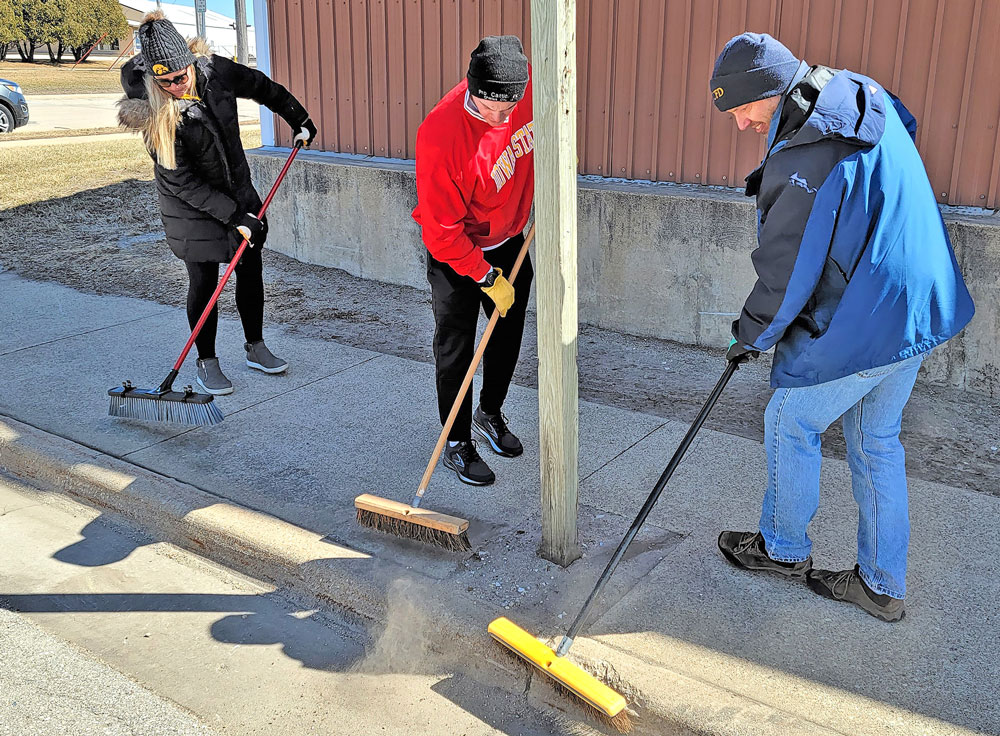Charles City development group again discusses pipeline easement options

By Bob Steenson, bsteenson@charlescitypress.com
The Charles City Area Development Corp., at its monthly meeting Wednesday morning, again discussed the potential for a carbon dioxide pipeline to cut across the Avenue of the Saints Development Park, which the CCADC owns.
Tim Fox, the CCADC executive director, said he hadn’t had any additional contact with Summit Carbon Solutions since the last meeting, where a recommendation from the group’s asset management committee to accept an easement offer from Summit had been tabled.
Summit is one of several companies proposing to bury liquid carbon dioxide pipelines through large swaths of Iowa and other Midwestern states, carrying the CO2 from ethanol plants and some other clean CO2 producers to sites where it would be sequestered by pumping it deep underground into geological formations.
Two such companies – Summit and Navigator CO2 Ventures – are proposing pipelines that would go through or into Floyd County.
Pipeline proponents say carbon capture and sequestration would lower ethanol plants’ carbon intensity scores so they could sell their ethanol at a premium in parts of the country with low carbon fuel mandates, instead of having to buy carbon credits to sell their products there. The participants would also share in $85 per ton in federal tax credits for every ton of carbon captured.
Opponents to the project raise concerns over pipeline safety, the projects’ impact on farmland where it would be buried, the ability of local emergency responders to be able to react to a pipeline rupture and the use of eminent domain to force permanent easements on landowners who don’t want the pipeline on their property.
The development corporation’s board took the action off the table Wednesday to listen to and discuss more information about the Summit project in particular.
Mark Kuhn, a newly seated Floyd County supervisor who is also now the county board’s representative on the CCADC, introduced Tim Whipple, an attorney with Ahlers & Cooney law firm of Des Moines, who the Board of Supervisors has hired to help the county write a zoning ordinance that would address where hazardous liquid pipelines can be located.
Whipple is also working with Shelby, Emmet, Montgomery, Palo Alto, Bremer, Butler and Harrison counties on pipeline issues, Kuhn said.
“This allows counties like Floyd to share costs for the IUB (Iowa Utility Board) hearings through a joint representation agreement,” Kuhn said.
Whipple, speaking with the CCADC board over videoconference, said several counties are working with him and his firm to write zoning ordinances to address land use and pipeline siting issues.
“It really comes back for many of the counties to a concern about economic development and about land use and about the best way to manage everyones’ various uses of the land for the best overall results for the the community,” Whipple said.
CCADC board member Paul Rottinghaus, who owns Zip’s Truck Equipment in New Hampton, the former Sherman Nursery property in Charles City and the former Kmart building, wondered whether Whipple’s efforts were against the pipelines in general or simply their location.
“The reality is it’s an environmental concern and it improves the situation environmentally, and by opposing it I don’t think that is in the long-term interest of the county,” Rottinghaus said. “I don’t think it’s grossly unsafe, but if we’re one of the countries that don’t allow it to go through our county and some other county does, we’re putting our farmers and the price of their grain and the feedstuffs that they might have available, these farmers are all at a disadvantage.
“If this is defined as a routing issue, I’m all for that. If this is against (the carbon dioxide pipelines) I think it’s short-sighted. I think logic would say that’s anti-development,” Rottinghaus said.
Whipple said he didn’t want it to appear that the supervisors were against the pipeline, but just that they had concerns about the most appropriate place to put it in relation to existing land uses.
Kuhn said, “To be clear, we are not opposed to the pipelines.”
But Kylie Lange, pipeline project manager for Summit, said some of the proposed zoning ordinances she has seen in other counties are pipeline-stopping ordinances.
“They would not allow pipelines in the county,” Lange said.
Lange said 82% of the property owners where the pipeline is proposed in Floyd County have voluntarily signed easements with Summit. The figure is 89% in Chickasaw County, 91% in Greene County and 100% in Boone County.
Kathy Carter of Rockford talked about a CO2 pipeline break in Satartia, Mississippi, in 2020, that sickened dozens of people and showed problems with getting effective emergency services responses, as an example of what could happen.
Rottinghous asked if the pipeline proposed to go through Floyd County was the same design as the Satartia pipeline.
Lange said the Satartia pipeline carried toxic hydrogen sulfide (H2S) in addition to CO2, was built in a terrible location and the company that built that pipe “made a ton of errors” in the location, construction and in the response to the rupture.
The Summit pipeline would carry only CO2 and would be built to more stringent safety standards than the federal government called for, she said.
Some sources discount the presence of H2S being a factor in the health impacts of the rupture.
Lange also noted that the Summit path in Floyd County largely follows existing easements for a natural gas pipeline, including through the development park.
She said Summit had agreed to bury the pipeline deeper and used thicker-walled pipeline to allow any company that purchases the development park to pave over the pipeline – which she said was the same allowance that was in place because of the natural gas pipeline.
Board member Sean Pitkin, of CUSB Bank, asked which was more dangerous – a natural gas pipeline or a carbon dioxide pipeline.
Pipeline opponent Carter said CO2 is pumped at much higher pressure than natural gas.
Lange said the CO2 pipelines are built to standards to handle that pressure – or in Summit’s case, to higher standards.
Several members of the CCADC board said they needed more information on the economic development impact and safety concerns before making any decisions, and Fox noted that the full board had not yet even seen the formal easement proposal.
Another Summit official at the meeting said he would send each board member a copy of the easement proposal, and the board ended discussion with no action.
Also at the meeting Wednesday, the board members:
- Reelected Ron Litterer as president, Scott Melliere vice president, Sarah George treasurer and Randy Heitz secretary.
- Heard a report from CCADC board member Dean Andrews, Charles City mayor, that the community housing committee had been meeting but was having difficulty finding times when all members could attend. He said the committee divided up into five subcommittees to better attack each concern and report back to the whole committee. The subcommittees are infill lots, incentives, upgrading existing housing stock, working with development corporations and new construction.
- Announced that CCADC agendas and meeting minutes would start being posted on the organization’s website. Fox said the CCADC is not a public body under the definition of the Iowa Open Meetings Law, but that it treats its monthly board meetings as open meetings.
The next CCADC meeting will be Wednesday, Feb. 22, at 8 a.m. at the Charles City NIACC Center.








Social Share